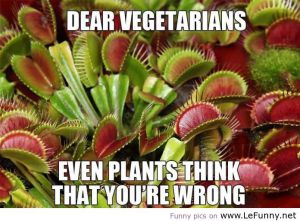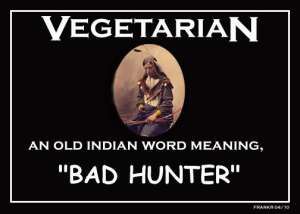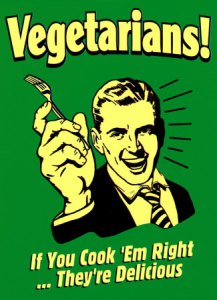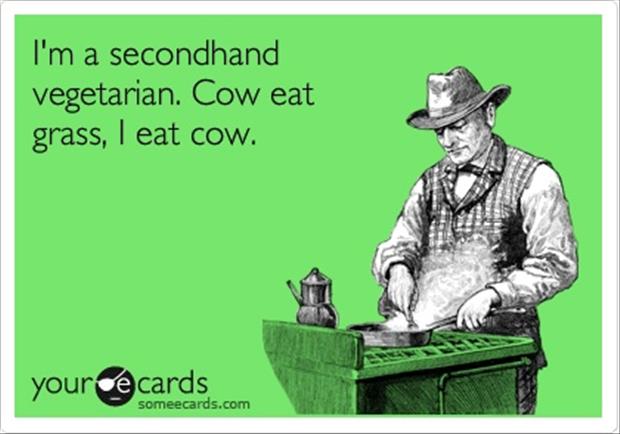Going vegetarian
Yep, I am turning vegetarian. And I am not kidding: I love meat, was even looking for the best burger in Pittsburgh but after a while, I felt a need for a change. This is really not an ethical choice about animals and is rather motivated by sustainability and health concerns. It is obvious that the way the actual industry produces meat cannot be safe for human consumption and the future, we will clearly not be able to produce enough animals to feed everybody without paying a price. Between 1950 and 2000, the world population increased by 200% while the the meat production increased by 500%. At that rate, trying to continue to raise livestock will just kill the planet by the use of intense farming which will be at the expense of earth resources but also ourselves because meat cannot be produced safely and will ultimately impact our health.
Going vegetarian is only part of the answer. You do not only need to remove the meat but think about the food chain and how we feed ourselves. This creates other challenges as well.
The Sustainable Perspective
The impact of the meat production industry is obvious. There are some facts:
- We kill more than 10 billions of animals a year in the USA only. At this production rate, there is no way to make it tasty (you need to speed up the rate at which the animal grows which make the taste of the meat worst than usual), good (animals are fed with junk food - corn, wheat, all the produces that is not their natural diet) and safe (that is why more than 90% is contaminated with fecal bacteria).
- This massive industrial production impacts the environment: in France, the pig farms has impacted the beach in Brittany. In the Netherlands, architects are trying to optimize building design to collocate more animals in a small tiny space. These so-called pig towers will then keep animals standing in a tower, feed them and collect waste. But do the maths, the equation is very simple: if you want to overproduce meat, you need to overproduce animals food which will ultimately lead to over production of waste. And this will impact water quality, soil and the global environment. By going vegetarian, you reduce the number of animals used and the potential impact on the environment.
- This might be a joke for you but cow farts are the third source of methane in the US. And cow farts produce more gas than transportation. By going vegetarian, you then support a more sustainable agriculture and lifestyle. This is pretty serious: as the population increases and developing country adopt a western diet, this will increase over time
The Health Impact
- Over-consuming meat increases the likelihood of getting colon cancer (one of the most common cancer in developed countries). You do not need the meat and if you wonder where to find your protein intake, you can get it from many non-meat produces. By going vegetarian, reduce the likelihood of getting a cancer.
- Many meat products contains a lot of fat and lead to heart diseases and hypertension. Pork, beef contains a pretty decent amount of fat. By going vegetarian, you can then using more better (more efficient) source of fat, such as olive oil or nuts.
- About 90% of meat products is contaminated with fecal bacteria which can then make you sick. By going vegetarian, you avoid any potential contamination (but are then exposed to other issue - more on that later).
Does going vegetarian really make sense?
Concerns about pesticide and GMO
By going vegetarian, you increase your consumption of fruits and vegetables. As pointed out before, meat consumption is not really healthy (contamination with fecal bacteria, lot of fats, salt when preparing that increase likelihood of heat diseases, etc.). On the other hand, many agriculture practices uses pesticides, which can have an important impact on your health as well. In addition, there is clear evidences that pesticides pollute the soil and the water system. So, if you want to stop meat to get healthier, you also need to be careful about where you get your vegetables and avoid pesticide-contaminated products.
Concerns of GMO have been raised over the last years. Some folks believed there are safe for consumption while other think this might be a big issue. Unlike the pesticide, there is no clear evidence of GMO risks. There was one study done on rats but it as been removed since. On the other hand, it does not mean that GMO are safe to consume: we have to remember the case of asbestos, which has been used for decades (about 100 years) before being declared as unsafe (and there was evidence since decades that is was responsible for many lung cancers). "Better to be safe than sorry": just avoid GMO as much as possible - let's wait a few years (probably one or two decades) and see what will happen on the long term.
Buying organic and local
In order to avoid pesticide and GMO food, there is no snake oil or silver-bullet. No matter what, you are going to eat some of it even if you do not want. GMO cultures spread over farms so that GMO products contaminates non-GMO produces. So, even if you buy non-GMO, there is a chance you still get some.
However, the label of organic food are regulated through the federal laws (you can see the USDA website for more details). Buying stuff with the USDA label ensures that at least 95% of the product avoids the typical crap (such as pesticide and other potential hazardous substances). As for GMO, organic products cannot be made using GMO seeds or ingredients. So, by buying products labeled USDA organic, you make a combo by avoiding what is sure to be unsafe (such as pesticide) but also avoid potential unknown issues from GMO. Be very careful about labels - there are a lot of different labels and be careful of what they mean. For example, "all natural" means nothing and is not restrictive and having a "non-gmo" claim does not mean your product is pesticide free. A general rule is to identify a few labels that match your expectations and stick to them.
On the other hand, in addition to buy USDA-organic labeled food, it is also important to buy locally sourced food products. Why buying organic products to reduce your impact on the environment if you package comes from overseas? For that reason, this is better to buy your products from a store that sells local products. In the Pittsburgh area, the food co-op provides food products that are locally sources, located 250 miles around the city as much as possible.
Why not going vegan?
Since a couple of years, many folks are going vegan, which is different from vegetarian: the vegetarian cannot eat meat but can still eat animal produces, such as cheese or eggs whereas vegans cannot eat them. On the other hand, the vegan diet is just extreme: by buying organic vegetables and animal produces (such as eggs, cheese), you ensure not only a good quality but also, animal products does not require to kill the animal early and is more efficient.
There is no way to go vegan and no evidence of health benefits. Eggs, milk, cheese is something I love (after all, I am French for a reason!). Why refrain yourself from enjoying what you like if it does not harm others? I do not think going vegan is an answer to the problems listed: you can embrace the vegan diet, buy vegetables from overseas (that use air transportation) which would be potentially contaminated with pesticides. What the point in that case: such a diet will impact the environment and your health. On the other hand, a vegetarian diet, associated with good choices that limit environmental impacts seems to be a reasonable choice.
Vegetarian? Forever?
I am seriously going vegetarian and reduce significantly my consumption of meat. However, there are some situations where this is difficult not to eat meat: lunch meeting, dinner at work, social events, etc. In that case, eating meat from time to time seems hard to avoid. Because, food is a also a social component in our society, this is difficult and sometimes not the best choice to put ourselves aside for dietary reasons. Of course, this is necessary not to eat something if you have an allergy, but this is another story. The objective is to reduce the environmental footprint and health issues from my diet, not to embrace a specific dogma. For that reason, the main guideline is just to stop buying meat products and just reduce as much as meat consumption when going outside.



